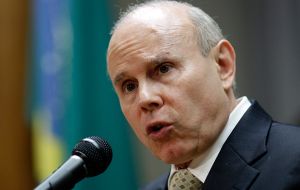MercoPress. South Atlantic News Agency
Brazil’s Real falls to 2 per dollar, lowest since 2009; government overwhelmed
 A strong dollar is good for the economy because it makes imports more expensive and exports cheaper, said Mantega .
A strong dollar is good for the economy because it makes imports more expensive and exports cheaper, said Mantega . Brazil’s Real tumbled to 2 per dollar for the first time in almost three years as Finance Minister Guido Mantega said the exchange rate doesn’t worry the government, opening expectations the currency may fall further.
The currency extended the biggest loss against the dollar this year as Greece’s debt turmoil and China’s slowdown weighs on the prospects for global growth.
The Real slid 1.5% to 1.9962 per US dollar in Sao Paulo after touching 2.0062, the weakest level since July 2009, when the world was trying to recover from the financial crisis. The currency has fallen 6.5% this year.
The yield on the Brazilian interest-rate futures contract due in January 2014 decreased nine basis points, or 0.09 percentage point, to 8.38%. The Bovespa index of stocks fell 3.2% to 57,539.61, its lowest closing level this year.
Brazil’s currency dropped as Mantega told reporters in Brasilia that the stronger dollar is good for the economy because it makes imports more expensive and exports cheaper.
“The government has never set parameters for the dollar and will not do so,” he said. “The dollar floats, and therefore will fluctuate according to the market.”
Brazil’s currency has been weaker than 1.90 since April 30 as central bank interventions to aid manufacturers and reductions in borrowing costs coincided with fiscal and political instability in Europe.
Policy makers will cut the Selic, as the target lending rate is known, to 8% by the end of 2012, down from the previous forecast of 8.5%, according to the median estimate in a May 11 central bank survey of about 100 economists published Monday.
The central bank has reduced the target rate 3.5 percentage points since August and policy makers may reduce the benchmark to as low as 8% from 9% by the end of August, trading in interest-rate futures shows. The central bank bought 7.2 billion dollars in the spot market in April, the most since 8.4 billion in March 2011.
Brazil’s bigger-than-expected 0.64% increase in prices last month won’t keep inflation from slowing toward its target, central bank President Alexandre Tombini told reporters in Rio do Janeiro last week.
“We are in a process in which inflation is converging” toward target, Tombini said. “Over the next three months, monthly inflation will be slower than in April.”
Tombini also said that the Real is weakening as part of a global trend that is strengthening the dollar against most currencies and that the floating exchange rate helps “protect the economy.”
While annual inflation in Latin America’s biggest economy has slowed to a 19-month low of 5.10%, the rate has remained above the 4.5% midpoint of the country’s target since August 2010. Brazil seeks to keep inflation within a range of 2.5% to 6.5%.




Top Comments
Disclaimer & comment rulesCommenting for this story is now closed.
If you have a Facebook account, become a fan and comment on our Facebook Page!